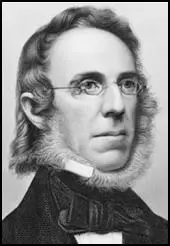Peter Cooper

Peter Cooper, the son of a hat maker, was born in New York on 12th February 1791. He received little schooling and as a child worked with his father before being apprenticed as a coach-builder in 1808.
Cooper moved to Long Island in 1812 and three years later he set up a business making machines for shearing cloth. Later he began to make furniture.
In 1828 Cooper built the Canton Iron Works in Baltimore. Soon afterwards he began work on the first steam locomotive built in America. Given the name Tom Thumb, it was completed in 1830. His business flourished and influenced by the ideas of Henry Bessemer, built the largest blast furnace in America in Philippsburg, New Jersey. He also established successful foundries at Ringwood and Durham.
Cooper became involved in laying the first Atlantic cable, and was president of the New York, Newfoundland & London Telegraph Company and the North American Telegraph Company.
A supporter of Abraham Lincoln and an opponent of slavery, Cooper was a strong advocate of enlisting black soldiers in the Union Army during the American Civil War.
In 1875 Cooper established the Greenback Party. Its main support came from farmers who were suffering from declining farm prices, high railroad rates and the government's deflationary currency policies. Cooper was the party's presidential candidate in 1876 but he won only 81,737 votes and was easily beaten by Rutherford Hayes (4,036,298) and Samuel Tilden (4,300,590). However, the party did send 15 representatives to Congress.
In 1878 members of the Greenback Party joined with urban trade union groups to establish the Greenback-Labor Party. James Weaver emerged as leader of the party and was its presidential candidate in 1880.During the campaign Weaver argued that the two major political parties had lost sight of their original democratic ideals of equal opportunity. He also claimed that the maintenance of the gold standard benefited banking interests but was driving farmers out of business. Weaver called for policies where all classes could share in the economic wealth of America.
Peter Cooper, who received the Bessemer gold medal from the Iron and Steel Institute of Great Britain in 1879, died in New York on 4th April 1883.
Slavery in the United States (£1.29)


